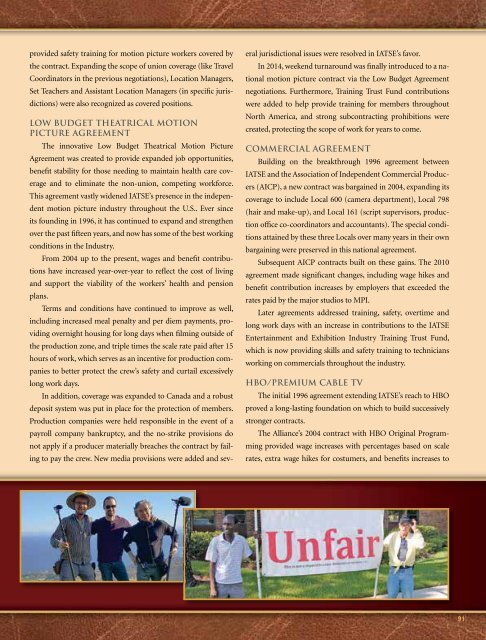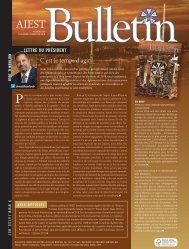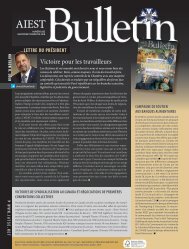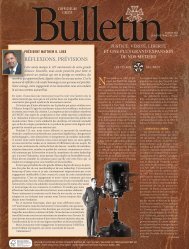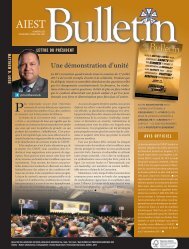IATSE-2nd2018_web
You also want an ePaper? Increase the reach of your titles
YUMPU automatically turns print PDFs into web optimized ePapers that Google loves.
provided safety training for motion picture workers covered by<br />
the contract. Expanding the scope of union coverage (like Travel<br />
Coordinators in the previous negotiations), Location Managers,<br />
Set Teachers and Assistant Location Managers (in specific jurisdictions)<br />
were also recognized as covered positions.<br />
LOW BUDGET THEATRICAL MOTION<br />
PICTURE AGREEMENT<br />
The innovative Low Budget Theatrical Motion Picture<br />
Agreement was created to provide expanded job opportunities,<br />
benefit stability for those needing to maintain health care coverage<br />
and to eliminate the non-union, competing workforce.<br />
This agreement vastly widened <strong>IATSE</strong>’s presence in the independent<br />
motion picture industry throughout the U.S.. Ever since<br />
its founding in 1996, it has continued to expand and strengthen<br />
over the past fifteen years, and now has some of the best working<br />
conditions in the Industry.<br />
From 2004 up to the present, wages and benefit contributions<br />
have increased year-over-year to reflect the cost of living<br />
and support the viability of the workers’ health and pension<br />
plans.<br />
Terms and conditions have continued to improve as well,<br />
including increased meal penalty and per diem payments, providing<br />
overnight housing for long days when filming outside of<br />
the production zone, and triple times the scale rate paid after 15<br />
hours of work, which serves as an incentive for production companies<br />
to better protect the crew’s safety and curtail excessively<br />
long work days.<br />
In addition, coverage was expanded to Canada and a robust<br />
deposit system was put in place for the protection of members.<br />
Production companies were held responsible in the event of a<br />
payroll company bankruptcy, and the no-strike provisions do<br />
not apply if a producer materially breaches the contract by failing<br />
to pay the crew. New media provisions were added and several<br />
jurisdictional issues were resolved in <strong>IATSE</strong>’s favor.<br />
In 2014, weekend turnaround was finally introduced to a national<br />
motion picture contract via the Low Budget Agreement<br />
negotiations. Furthermore, Training Trust Fund contributions<br />
were added to help provide training for members throughout<br />
North America, and strong subcontracting prohibitions were<br />
created, protecting the scope of work for years to come.<br />
COMMERCIAL AGREEMENT<br />
Building on the breakthrough 1996 agreement between<br />
<strong>IATSE</strong> and the Association of Independent Commercial Producers<br />
(AICP), a new contract was bargained in 2004, expanding its<br />
coverage to include Local 600 (camera department), Local 798<br />
(hair and make-up), and Local 161 (script supervisors, production<br />
office co-coordinators and accountants). The special conditions<br />
attained by these three Locals over many years in their own<br />
bargaining were preserved in this national agreement.<br />
Subsequent AICP contracts built on these gains. The 2010<br />
agreement made significant changes, including wage hikes and<br />
benefit contribution increases by employers that exceeded the<br />
rates paid by the major studios to MPI.<br />
Later agreements addressed training, safety, overtime and<br />
long work days with an increase in contributions to the <strong>IATSE</strong><br />
Entertainment and Exhibition Industry Training Trust Fund,<br />
which is now providing skills and safety training to technicians<br />
working on commercials throughout the industry.<br />
HBO/PREMIUM CABLE TV<br />
The initial 1996 agreement extending <strong>IATSE</strong>’s reach to HBO<br />
proved a long-lasting foundation on which to build successively<br />
stronger contracts.<br />
The Alliance’s 2004 contract with HBO Original Programming<br />
provided wage increases with percentages based on scale<br />
rates, extra wage hikes for costumers, and benefits increases to<br />
91


